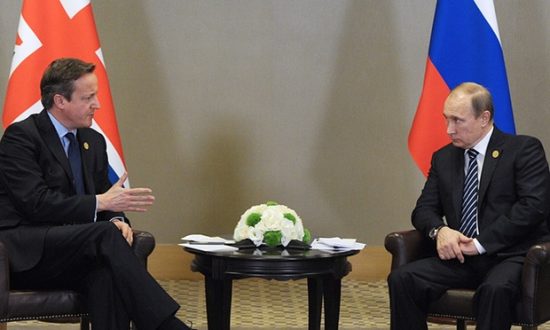David Cameron: gap with Russia over Assad rule in Syria narrowing
UK prime minister meets Vladimir Putin at G20 summit in Turkey and admits he has failed to convince some MPs of case for more airstrikes against Isis
David Cameron has said the gap between Britain and Russia over the future political role of Syria’s president, Bashar al-Assad, has narrowed.
But Britain’s prime minister acknowledged he had failed to convince some MPs that his call for a UK bombing campaign in Syria was coupled with a wider plan to bring peace to the country.
Speaking at the G20 summit in southern Turkey, he said: “It is perfectly right to say a few extra bombs and missiles won’t transform the situation. Our plan has always been that we need a political transition in Syria, as well as degrading and destroying Isis in Syria.”
He added: “Those people who have been uncertain about taking action in Syria often make the point they want to know about future plans for how you help to bring that country together. My argument is those plans are right there but they need to be set out more clearly and more explanation given.”
It is one of Cameron’s frankest admissions that he has failed to convince some MPs, including the Labour frontbench and some Tory backbenchers, that he has a political plan for the future of Syria that goes further than destroying Isis in the country’s north and leaving Assad in place. His remarks also suggest he has no short-term intention of going to parliament to seek support for wider airstrikes.
Cameron was speaking after meeting Russia’s president, Vladimir Putin, on the fringes of the summit. Government sources said the hour-long meeting was the first between the two leaders for a year and that it was measured and dominated by the Syrian question. They said progress had been made.
Cameron told a press conference that he had urged Putin to stop bombing the moderate Free Syrian Army and to recognise that with compromise on both sides it would be possible to install a stable regime in Syria to replace Assad.
The prime minister is due to hold an unscheduled extra meeting with UK allies on Syria on the fringes of the summit to discuss the state of the peace process. He was also due to meet King Salman of Saudi Arabia, one of the countries calling for Assad to be deposed.
He said: “We think bombing the Syrian Free Army that can play a part and should play a part in the future of Syria is a mistake. I made that view absolutely clear to President Putin; there are some signs, some signs, that they are focusing on Isil [Isis] and we need to see if that continues.”
Advertisement
He added: “Everyone recognises there is a need for compromise. The gap has been enormous between those like us who say President Assad must go immediately and those who continue to support him.
“It is not as if there has been a British pride or stubbornness, an American stubbornness or a Saudi stubbornness. This is for the Syrian people. If you barrel-bomb your own nation and rain down destruction on your own people, it’s obvious that they won’t accept him as their leader and as some Syrians still do. That is the gap we have and it has been reduced. I hope we can close the gap still further but it will need compromise on both sides.
“I have said Assad should go immediately and we have come to recognise there is a transition. We have never argued that the right answer is take away all the elements of the Syrian state. What is required here is a future for Syria that is stable and can work and that requires some elements of the state to continue. We need to find elements in the government – Christians, Kurds and Alawites – so that government represents all of Syria and that is the process that needs to be gone through.
“Let us be frank, we have been coming to the G8, G7 and and G20 and talking about this issue over and over again, and yet the body count has piled up, the migration issue has got worse and the terrorism situation has deteriorated. In the end it has to be a political case that the Syrian people accept.”
Cameron insisted there was no logic in the British bombing campaign being confined to Iraq. He said: “I think there is a very strong case that Isil does not stop at the Iraq-Syrian border and therefore neither should we. I recognise I need to do more to build this argument, to build this case, to take parliament with me and people want to know there is a whole plan for the future of Syria and the whole region because it is perfectly right to say that a few extra bombs and missiles cannot transform the whole situation.”
He said the faster Isis was degraded, the safer western nations would be, but he said the only way to be safe in the longer term was to ensure a proper Syrian government.
THE GUARDIAN

